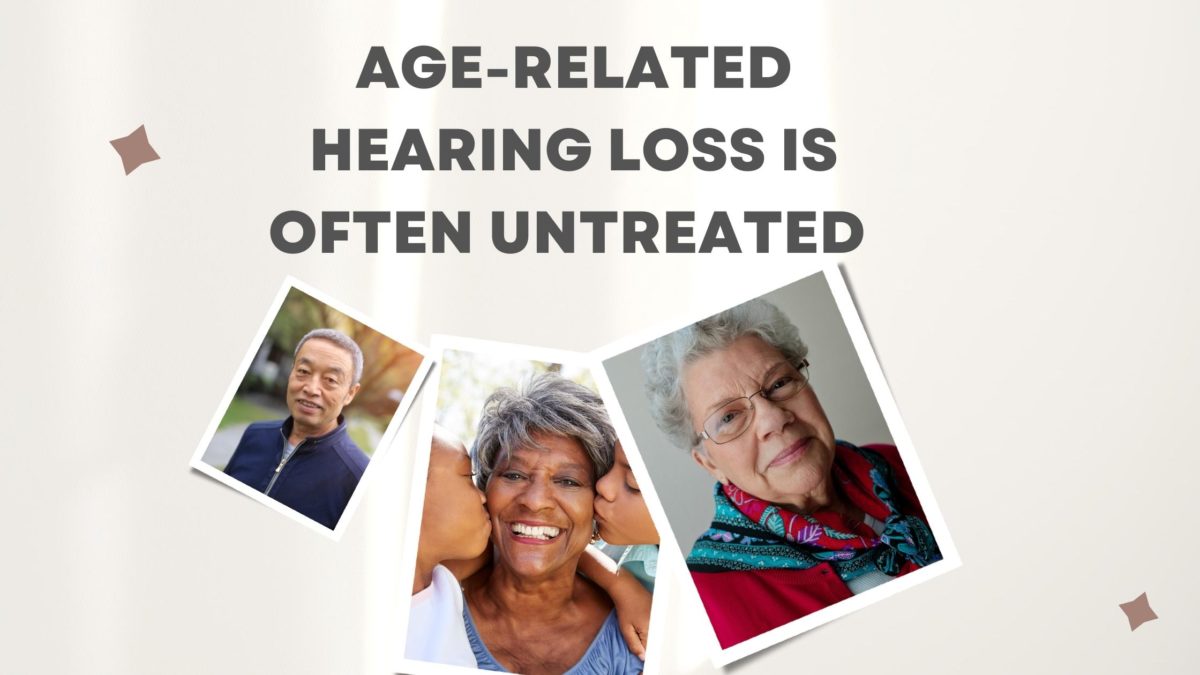Age-related hearing loss is likely more common than you think. Half of all adults who are 75 and older have disabling hearing loss. Though hearing loss significantly impacts older adults, it often remains untreated. It is estimated that it takes an average of 7 years for people to address hearing loss symptoms from when they first started. Untreated hearing loss has multifaceted effects that can take a toll on health and quality of life. This includes straining communication, affecting relationships, deteriorating social life, and increasing health risks. Seeking treatment and intervening as early as possible can not only protect your hearing health but help you live a fuller life.
Age-Related Hearing Loss
Aging is one of the most common causes of hearing loss. Age-related hearing loss, also known as presbycusis, can occur as a result of a few factors. This includes the impact of loud noise exposure over time which can damage the sensory cells in the inner ear as well as existing medical conditions which increase the risk of developing hearing loss. Extensive research shows that health issues like cardiovascular disease, diabetes, and osteoporosis can contribute to hearing loss. These medical conditions are also disproportionately experienced by older adults.
Age-related hearing loss is pervasive. According to the National Institute on Deafness and Other Communication Disorders (NIDCD), rates of hearing loss increase with age:
- 1 in 3 adults ages 65-74 has some degree of hearing loss.
- 1 in 2 adults ages 75 and over have disabling hearing loss.
Hearing loss is the third most common chronic medical condition among older adults. Though it is extremely common, it is often underdiagnosed and undertreated. The NIDCD estimates that only one-third of people with hearing loss who could benefit from treatment receive it.
Widespread Inaction on Hearing Loss
Several studies show that there is widespread inaction when it comes to hearing loss. This includes a recently published study that was conducted by the American-Speech- Language -Hearing Association (ASHA). Researchers collected information about addressing hearing loss from nearly 2,500 people and identified the following key findings:
- 2 in 10 adults have had their hearing tested in the past 5 years compared to 6 in 10 adults who have had their vision tested.
- More than 51% of people reported having hearing issues but only 11% have sought treatment.
- 78% of those with hearing issues have been experiencing them for 1 or more years, and over 35% have had trouble for 5 or more years.
These statistics reveal that hearing health is not prioritized and the delay in treatment even when hearing loss symptoms are present. This widespread inaction can be attributed to a few factors including misconceptions about hearing loss, stigma associated with the condition, and the lack of information people have about it. Though acknowledging the reality of hearing loss can be challenging, it is the first step towards transforming your health. As Lynn Williams, ASHA President emphasizes, “this inaction on hearing health is especially unfortunate because there are effective treatment options that can enable adults with hearing loss to live fuller and more satisfying lives.”
Seeking Treatment
The first step you can take to address hearing loss is having your hearing assessed by a hearing healthcare specialist. Hearing tests involve a painless and non-invasive process that measures hearing capacities in each ear. This identifies any hearing loss and the degree of impairment that you could be experiencing. Hearing tests are a great tool that measures the baseline of your hearing health and needs. Once this is established, your hearing healthcare provider can recommend treatment options that could effectively meet your hearing needs.
Hearing aids are the most common treatment for hearing loss. These are medical devices that are equipped with technology that absorbs and processes speech as well as sound. This provides the ears and brain with significant support, alleviating hearing loss symptoms and making it easier to hear. Hearing aids improve daily life in countless ways including by strengthening communication which is an essential way we navigate our environments. This improves relationships, social engagement, and overall health.
Contact us today to schedule an appointment for a hearing consultation.

